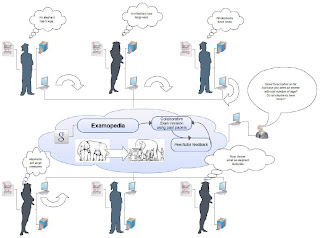My year started with me making a guest post on Steve Wheeler's award winning blog which can be accessed at "Wisdom of Clouds". By the end of January, there had been a huge number of visits to the post on Steve's and my blog. This spurred a healthy debate which I analyse in another post -Cloudy with a chance of change!. The debate also highlighted this formal and informal divide once again.
Maybe Graham Atwell misunderstood my stance on PLEs and to clear that I tweeted this on the 24rth of January:
I am not against the concept of #PLEs, in fact they are gr8 for lifelong learning: commented on @GrahamAttwell blog-post http://bit.ly/4quEEW
my only concern is about when people come to universities do they already have a #PLE, does our VLE/LMS/CMS encourage creation of PLEs?
are PLEs easily integrated within formal education?
why do we want to separate formal and informal learning? when we all know learning knows no boundary
As it happens on twitter, this started a discussion between a few of us who were up that late and joined in:
nlafferty: @manmalik they maybe don't have a #PLE when they come at the moment but another year or two or three and I think they will
me: @nlafferty all the more a reason for our VLEs to change and become more "open" as @sputuk would add :)
nlafferty:@manmalik I agree they should be more open, do you think current VLEs are really learning environments or admin/management environment envt?
me: @nlafferty I think they R gd as LMS/CMS & thr is potential 4 these 2 provide formal learning but not informal-not obvious atleast #ple #cle
jamesclay:@manmalik once you integrate informal learning, it becomes formal learning. You can't plan or design informal learning.
jamesclay:@manmalik once integrated they are no longer PLEs. You can add institutional systems to your PLE, but not the other way.
me:@jamesclay re planning informal...I think U can collect stats on wht R the most commonly used informal ways students learn & integr8 some
creativetallis: @jamesclay @manmalik No, but you can help to create conditions in which it thrives
me:@jamesclay I do like wht U said abt both informal & PLEs...however there R ways 2 include & benefit from some informal approaches
nlafferty: @manmalik LMS/CMS can deliver learning content & some tools can support formal learning - I'm interested in what students think of VLEs tho'
nlafferty: @manmalik I'm using VLE as teacher & student - as a student I would say my learning is happening in my PLE. Agree with @jamesclay comments
me:@nlafferty a PLE is gr8 for life-long learning, I take it you are a one :)
nlafferty: @manmalik Yep, at least like to think of myself as one, partly why think important for students not just to use VLE but to develop their PLE
nlafferty: @manmalik Maybe #CLE will speed up, interesting that OU have opted for google apps
me:@nlafferty exactly my point, students need to develop a #ple they do not always have one, a #CLE introduces will perhaps speed this up :)
me:@jamesclay re: adding instl syst 2 #ple & not the other way: I think if u have a #CLE U cn add PLE 2 an institutional #CLE too, nt with #VLE
jamesclay: @creativetallis @manmalik exactly
jamesclay:@manmalik as soon as you include it it becomes formal. Create environments for informal, but you can't make informal happen.
I am looking for some answers.
- Is mixing a PLE with the institutional system a one way process ("You can add institutional systems to your PLE, but not the other way")? Or is this just a technical limitation of PLEs and existing Institutional systems (LMS/CMS/VLEs)?
- Is it true that educational institutions can just facilitate/create environments for informal learning and not make it happen?
- Is there a grey area between the formal and informal that needs attention of the academics? Especially with online learning environments and tools.
Some more interesting read on this I found through @C4lpt http://goodpractice.com/blog/planning-to-implement-informal-learning/


